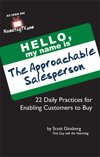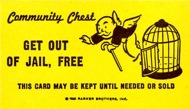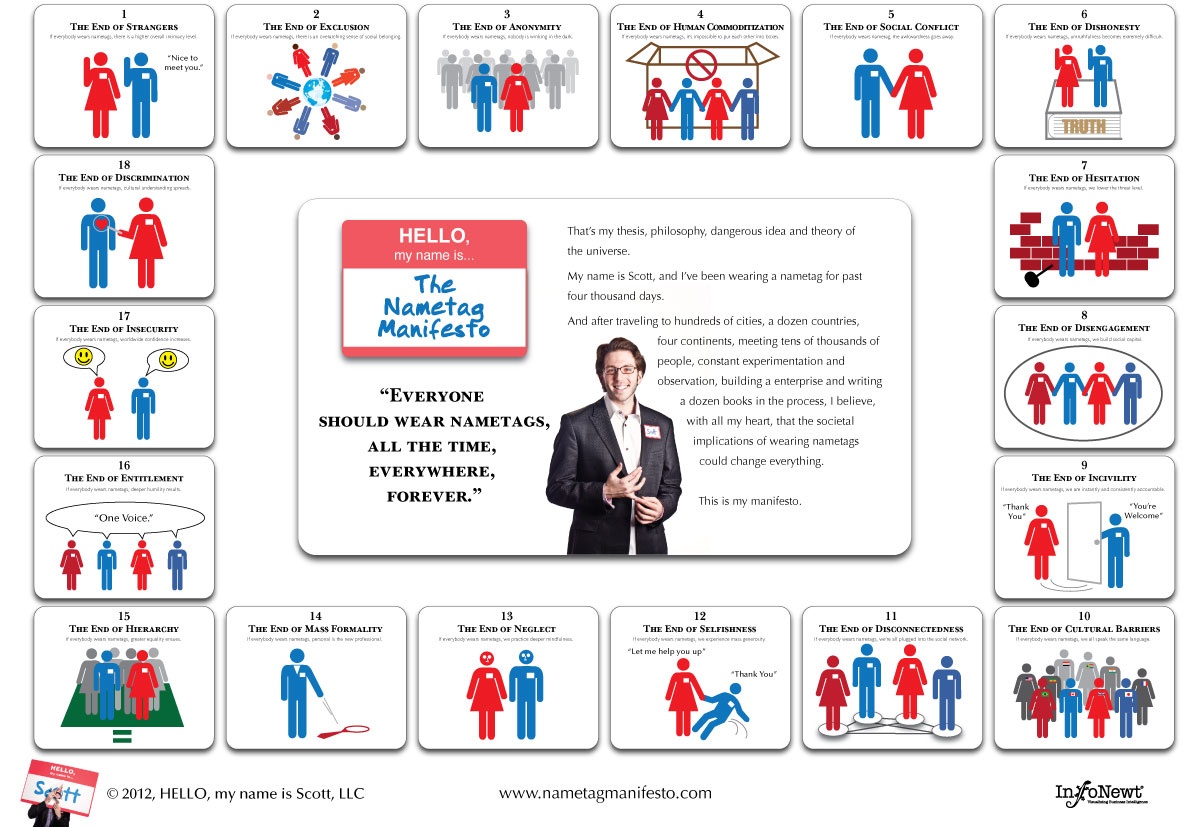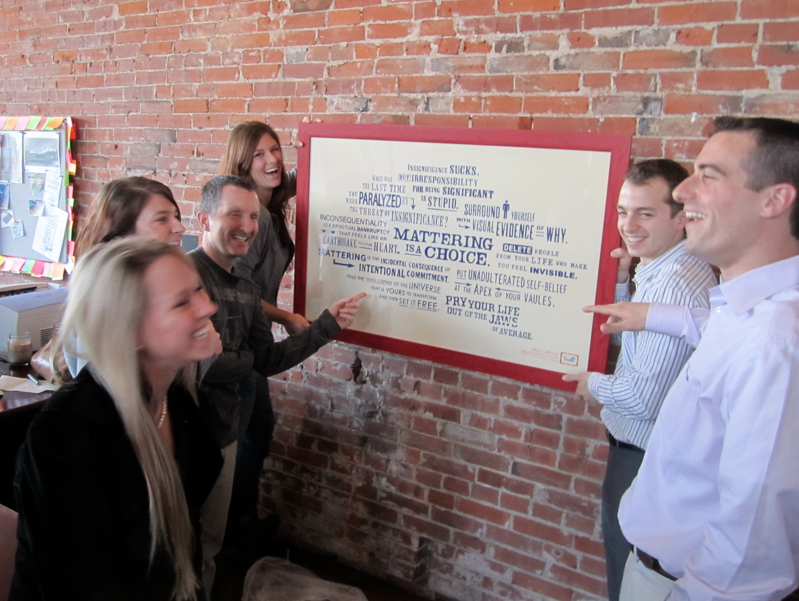You’re not in business to sell a product.
You’re not in business to provide a service.
You’re in business to become known for a unique way of interacting with the world.
Interactions that get talked about.
Interactions that give the gift of social elevation.
Interactions that very well could change people forever.
THAT’S THE GOAL: To interact with people in a way that nobody else can touch.
Today we’re going to explore a collection of interactions to incorporate into your daily worklife:1. Interact with swift responsiveness. The medium is the message. The speed of the response is the response. And when you become known for returning calls, sending emails and replying to instant messages quicker than anyone else, people don’t just pay attention – they pay money.
Speed is a form of currency. Speed is an asset that appreciates with every interaction in which it is exalted. And even if you don’t have all the answers. Customers would rather you get back to them right away just to say you’re on the case, than having to wait three days just to discover you still haven’t solved it. When was the last time one of your customers said, “Wow, that was fast?”
2. Interact with nonstop gratitude. Gratitude is not a chore. It’s not a corporate initiative. And it’s not some annual act of forced kindness that makes you feel good about yourself. Gratitude is giving the gift of attention. Gratitude is existing in a perpetual posture of thankfulness. Gratitude is a telling people how much better your life is because of them.
Instead of reaching for another robotic, ready-made script about how important someone’s call is, say something that invites customers to store memory in the heart. How could you turn your words into a gift that erases the memory of every other gift customers have ever received?
3. Interact with true care. You don’t need another soulless bureaucratic tactic that bastardizes caring into a technique. What you need is to create a sincere individual strategy that shows people you care about their experience when they’re interacting with you.
That’s the beauty of care: It’s found in the basic. It’s when you bother to bother. It’s when you show up, even when you’re scared, and take five extra minutes to do something that people remember forever. The best part is, caring is like epoxy glue. It only takes a few drops to make it stick. Your just have to listen to find out where people need the glue applied. Do you have the courage to care?
4. Interact with unexpected honesty. Honestly is attractive because it always has been. It’s a classical value. And few virtues have been around longer. What’s changed is, technology makes dishonesty easier to spot, quicker to spread and harder to disguise.
Every interaction that leaves a customer skeptical about your truthfulness, makes your company suck a little bit more. If you want your interactions to matter, tell the truth when there’s no reason to be honest. Tell the truth when most people would say nothing. How are you branding your honesty?
5. Interact with compassionate intimacy. Instead of plotting how customers fit into your nice little marketing plan; focus on how your product fits into their lives. And not just the conversation about their lives, but their actual lives.
That’s the distinction: Intimacy isn’t starting with customer in mind – it’s start with the customer. Intimacy isn’t projecting onto the marketplace what you think they ought to want – it’s asking people to tell you what matters to them, shutting up and taking notes. What would happen if you treated customer intimacy as an entire business model, not just a marketing tool?
6. Interact with exquisite playfulness. Wearing a nametag everyday never fails to generate spontaneous moments of playfulness. The cool part is, these are people I’m meeting for the first time. What about your customers? Is their very first interaction with your brand friendly, fun and relaxed?
Or has your organization – in the name of professionalism – prohibited its employees from expressing any shred of playfulness?
The point is: Not every customer craves an unforgettable service experience. Sometimes they just want to laugh. To play. To forget about life for ten seconds. Maybe if you focused on that, they’d come back. How playful are you willing to be?
7. Interact with loving unfairness. Love isn’t supposed to be fair. If it was, it wouldn’t be love – it would be strategy. Silly rabbit. Fairness is for kids. That’s how love works: It finds the people who don’t deserve it – then offers itself to them freely and fully when they least expect it.
Next time customers reflexively apologize for minor inconveniences, forgive them. Next time readers offer negative criticism about your brand; tell them you respect their opinion of your work. Because if you only love people when it’s fair, you haven’t learned anything. When was the last time you loved a customer that drove you up the wall?
REMEMBER: The goal of your brand is become known for a unique way of interacting with the world.
Find your nametag.
Stick yourself out there today.
LET ME ASK YA THIS…
What engagement style are you know for?
LET ME SUGGEST THIS…
For a list called, “66 Questions to Prevent Your Time from Managing You,” send an email to me, and you win the list for free!
* * * *
Scott Ginsberg
That Guy with the Nametag
Author, Speaker, Entrepreneur, Mentor
[email protected]
 Sick of selling?
Sick of selling?
Tired of cold calling?
Bored with traditional prospecting approaches?
Buy Scott’s book and learn how to sell enable people to buy!
Pick up your copy (or a case!) right here.

 People don’t just buy what you sell.
People don’t just buy what you sell.  “I usually refuse to pay for mentoring. But after Scott’s first brain rental session, the fact that I had paid something to be working with him left my mind – as far as I was concerned, the value of that (and subsequent) exchange of wisdom and knowledge, far outweighed any payment.”
“I usually refuse to pay for mentoring. But after Scott’s first brain rental session, the fact that I had paid something to be working with him left my mind – as far as I was concerned, the value of that (and subsequent) exchange of wisdom and knowledge, far outweighed any payment.” The best part about playing Monopoly was drawing a chance card.
The best part about playing Monopoly was drawing a chance card.
 Think about the last time one of your customers made the following complaint:
Think about the last time one of your customers made the following complaint: “I usually refuse to pay for mentoring. But after Scott’s first brain rental session, the fact that I had paid something to be working with him left my mind – as far as I was concerned, the value of that (and subsequent) exchange of wisdom and knowledge, far outweighed any payment.”
“I usually refuse to pay for mentoring. But after Scott’s first brain rental session, the fact that I had paid something to be working with him left my mind – as far as I was concerned, the value of that (and subsequent) exchange of wisdom and knowledge, far outweighed any payment.” “Acts of friendliness in moments of anonymity.”
“Acts of friendliness in moments of anonymity.” I grew up in St. Louis, Missouri.
I grew up in St. Louis, Missouri. Last time I was in Florida, I passed a woman on the beach wearing a shirt that read:
Last time I was in Florida, I passed a woman on the beach wearing a shirt that read: “I usually refuse to pay for mentoring. But after Scott’s first brain rental session, the fact that I had paid something to be working with him left my mind – as far as I was concerned, the value of that (and subsequent) exchange of wisdom and knowledge, far outweighed any payment.”
“I usually refuse to pay for mentoring. But after Scott’s first brain rental session, the fact that I had paid something to be working with him left my mind – as far as I was concerned, the value of that (and subsequent) exchange of wisdom and knowledge, far outweighed any payment.”
 My job is to help companies make their mission more than a statement, using limited edition social artifacts.
My job is to help companies make their mission more than a statement, using limited edition social artifacts.